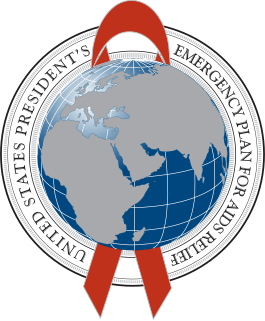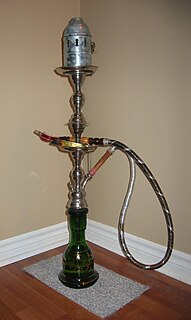
Preventive healthcare, or prophylaxis, consists of measures taken for disease prevention. Disease and disability are affected by environmental factors, genetic predisposition, disease agents, and lifestyle choices, and are dynamic processes which begin before individuals realize they are affected. Disease prevention relies on anticipatory actions that can be categorized as primal, primary, secondary, and tertiary prevention.

The United States President's Emergency Plan For AIDS Relief (PEPFAR) is a United States governmental initiative to address the global HIV/AIDS epidemic and help save the lives of those suffering from the disease. Launched by U.S. President George W. Bush in 2003, as of May 2020, PEPFAR has provided about $90 billion in cumulative funding for HIV/AIDS treatment, prevention, and research since its inception, making it the largest global health program focused on a single disease in history until the COVID-19 pandemic. PEPFAR is implemented by a combination of U.S. government agencies in over 50 countries and overseen by the Global AIDS Coordinator at the U.S. Department of State. As of 2021, PEPFAR has saved over 20 million lives, primarily in Sub-Saharan Africa.
Students Working Against Tobacco or SWAT is the shared name of independent groups across the United States who work to educate and unite students against the alleged manipulation and targeting of youth by tobacco companies. Each division of SWAT is managed independently from state-to-state.
The Tobacco Master Settlement Agreement (MSA) was entered in November 1998, originally between the four largest United States tobacco companies and the attorneys general of 46 states. The states settled their Medicaid lawsuits against the tobacco industry for recovery of their tobacco-related health-care costs. In exchange, the companies agreed to curtail or cease certain tobacco marketing practices, as well as to pay, in perpetuity, various annual payments to the states to compensate them for some of the medical costs of caring for persons with smoking-related illnesses. The money also funds a new anti-smoking advocacy group, called the Truth Initiative, that is responsible for such campaigns as Truth and maintains a public archive of documents resulting from the cases.

The American Cancer Society Cancer Action Network is a nonprofit, nonpartisan advocacy affiliate of the American Cancer Society. It was founded in September 2001 to directly lobby the goals of the American Cancer Society, which is subject to restrictions on advocacy activities because of its tax classification. ACS CAN works to make cancer a national priority. Specifically, it advocates for better access to care, cancer prevention and early detection programs, cancer research funding, regulation of tobacco by the U.S. Food and Drug Administration, better quality of life for cancer patients, and attempts to raise awareness of and reduce cancer disparities. Members include cancer survivors, caregivers, patients, volunteers, and students, including Colleges Against Cancer.

The Golden LEAF Foundation is a nonprofit corporation based in Rocky Mount, North Carolina in the United States, that was created in 1999 to receive half of the funds coming to North Carolina from the master settlement agreement with cigarette manufacturers. The foundation is now devoted to advancing the economic well being of North Carolinians and to transforming its economy. It works in partnership with local governments, educational institutions, economic development organizations and other public agencies, and nonprofits to achieve this goal.

Tobacco politics refers to the politics surrounding the use and distribution of tobacco.
Tritent International Corp. v. Commonwealth of Kentucky, 467 F.3d 547, is a US antitrust law case decided by the Court of Appeals on the Sixth Circuit. The case is notable, inter alia, because it provides a summary of the difficult terms of the Tobacco Master Settlement Agreement.
The Tobacco MSA with New York is the particular version of the Tobacco MSA that was signed in New York City, was enabled by means of legislation in New York State, and has been interpreted since then in New York State courts.

Tobacco has a long history in the United States.
Smoking in China is prevalent, as the People's Republic of China is the world's largest consumer and producer of tobacco: there are 350 million Chinese smokers, and China produces 42% of the world's cigarettes. The China National Tobacco Corporation is by sales the largest single manufacturer of tobacco products in the world and boasts a monopoly in Mainland China generating between 7 and 10% of government revenue. Within the Chinese guanxi system, tobacco is still a ubiquitous gift acceptable on any occasion, particularly outside urban areas. Tobacco control legislation does exist, but public enforcement is rare to non-existent outside the most highly internationalized cities, such as Shanghai and Beijing. Furthermore, outside the largest cities in China, smoking is considered socially acceptable anywhere at any time, even if it is technically illegal.
The majority of lifelong smokers begin smoking habits before the age of 24, which makes the college years a critical time for tobacco companies to convince college students to pick up the habit of cigarette smoking. Cigarette smoking in college is seen as a social activity by those who partake in it, and more than half of the students that are users do not consider themselves smokers. This may be because most college students plan to quit smoking by the time that they graduate.
Tobacco marketing targeting African-Americans refers to the practice of customizing tobacco products and advertising techniques specifically to African-American consumers. It is most commonly analyzed through the consumption of mentholated cigarettes, as it represents 47% of black adult smokers and 84% of adolescent black smokers.

The use of tobacco products in Egypt is widespread. It is estimated that approximately twenty percent of the population uses tobacco products daily. Cigarettes are the most common form of tobacco consumption in Egypt, with an estimated twenty billion cigarettes smoked annually in the country. After cigarettes, shisha water-pipes are the most common form of tobacco consumption. Many Egyptians are not fully aware of the health risks of using a water-pipe and many believe it to be less harmful than cigarettes.
The United States federal budget consists of mandatory expenditures, discretionary spending for defense, Cabinet departments and agencies, and interest payments on debt. This is currently over half of U.S. government spending, the remainder coming from state and local governments.
Tobacco Free Florida is an anti-smoking organization based in the U.S. state of Florida, administered by the Florida Department of Health.

Proposition 29, the California Cancer Research Act, is a California ballot measure that was defeated by California voters at the statewide election on June 5, 2012.

Truth Initiative is a nonprofit tobacco control organization "dedicated to achieving a culture where all youth and young adults reject tobacco." It was established in March 1999 as a result of the Tobacco Master Settlement Agreement between the attorneys general of 46 states, the District of Columbia and five United States territories, and the tobacco industry. Truth Initiative is best known for its youth smoking prevention campaign. Its other primary aims include conducting tobacco control research and policy studies, organizing community and youth engagement programs and developing digital cessation and prevention products, including through revenue-generating models. The organization changed its name from the American Legacy Foundation to Truth Initiative on September 8, 2015, to better align with its Truth campaign. As of 2016, the organization had more than $957 million in assets and a staff of 133 based primarily in its Washington, D.C., office.
The UCSF Truth Tobacco Industry Documents is a digital archive of tobacco industry documents, funded by Truth Initiative and created and maintained by the University of California, San Francisco. The Library is a part of the larger UCSF Industry Documents Library which also includes the Drug Industry Document Archive, the Food Industry Documents Archive and the Chemical Industry Documents Archive. TTID contains over 14 million documents produced by major tobacco companies and organizations, many of them internal strategic memoranda made public as a consequence of the Tobacco Master Settlement Agreement. The documents deal with the tobacco industry's advertising, manufacturing, marketing, sales, and scientific research activities for the last century. Researchers, journalists, students, and activists interested in tobacco control issues and public health policies use the Library extensively to investigate tobacco industry strategies. Research in this archive revealed the tobacco industry playbook and its parallels with techniques linked to climate change denial.
Dileep G. Bal is an Indian-American physician, epidemiologist, and public health administrator. He is also a faculty member of the John A. Burns School of Medicine of the University of Hawaii at Manoa, and previously of the University of California School of Medicine at Davis and the University of Arizona College of Medicine. As a public servant, health advocate and academic researcher, his areas of focus include tobacco control, cancer and obesity prevention, and remedying socio-economic disparities in health care.








